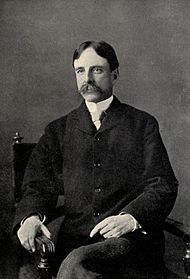Robert Grant (novelist)
| Robert Grant | |
|---|---|
 |
|
| Born |
January 24, 1852 Boston, Massachusetts |
| Died | May 19, 1940 (aged 88) Boston, Massachusetts |
| Nationality | American |
Robert Grant (January 24, 1852 – May 19, 1940) was an American author and a jurist who participated in a review of the Sacco and Vanzetti trial a few weeks before their executions.
Grant was born to a Patrick Grant (1810-1895) and Charlotte Boardman (Rice) Grant (1821-1882) in Boston, Massachusetts on January 24, 1852 and was a descendant of Edmund Rice an early immigrant to Massachusetts Bay Colony. He attended Boston Latin School and graduated from Harvard University in 1873. At one point in his college career he was publicly reprimanded for missing chapel on 22 occasions. He received the first Ph.D. in English granted by Harvard in 1876 and a law degree in 1879.
His first novel appeared in 1880. It was called The Confessions of a Frivolous Girl, a realistic depiction of the problems facing young women. He published his second novel An Average Man in 1883, a study of two young New York lawyers with very different ambitions. His next novel was Face to Face (1886), which demonstrated the difference between English and American manners and social standards. He followed that with the novel that proved to be his most successful. Unleavened Bread (1900), the story of a woman who abandons her moral standards in her search for prestige and dominance was one of the best selling novels of 1900.
His output continued with The Undercurrent (1904); The Orchid (1905), an examination of the impact of divorce in the upper class; The Chippendales (1909), the story of the decline in character of a Boston family over the course of several generations; The High Priestess (1915), detailing a woman's struggle to have a career; and The Bishop's Granddaughter (1925), a humorous view and critique of American divorce law.
At the same time as he pursued his writing, Grant was also served as a probate court judge from 1893 to 1923. He was an Overseer of Harvard University from 1896 to 1921 as well. He served as president of the Harvard Alumni Association in 1922 and of the Harvard Club of Boston in 1923-24 and held honorary degrees from Harvard and Columbia.
He was called out of retirement by Massachusetts Governor Alvan T. Fuller to serve on an Advisory Committee with President Abbott Lawrence Lowell of Harvard and President Samuel Wesley Stratton of MIT. They were tasked with reviewing the trial of Sacco and Vanzetti to determine whether the trial had been fair. Some criticized Grant's appointment to the Committee, with one defense lawyer saying he "had a black-tie class concept of life around him," but Harold Laski in a conversation at the time found him "moderate." Others cited evidence of xenophobia in some of his novels, references to "riff-raff" and a variety of racial slurs. A biographer notes that he was not a good choice as he was not a legal scholar and was handicapped by age.
...
Wikipedia
